Q Exchange
Shifting the paradigm – from managing illness to promoting wellness
- Winning idea
- 2023
Meet the team
Also:
- Aisha Shah (young person, service user doing internship at UCLH)
- Rhea Burman (young person, service user doing internship at UCLH)
- Naz Celic (young person, service user, doing internship at UCLH)
- Sophia Mavrommatis (Therapy lead)
- Corinne Fisher (Clinical lead)
- Debajit Sen (Divisional-Clinical Director)
- Ruth Harvey (service user and Senior QI facilitator)
What is the challenge your project is going to address and how does it connect to the theme of 'How can improvement be used to reduce delays accessing health and care services'?
In long-term conditions like rheumatic diseases, medical interventions are estimated to impact by less than 50% on health outcomes, as opposite to social determinants of health and health-related behaviours. Young people (YP), significantly sensitive to peer influences, are particularly vulnerable to health-behaviours (poor medication-adherence, lifestyle-choices..), and their resulting adverse impacts on individuals health-outcomes. Our Adolescent & Young Adult(AYA) Rheumatology team , experienced significant increase of AYA struggling with self-managing their conditions, impacting on our service delivery and capacity. Engagement events with YP identified two key priority projects: improving clinic consultation and developing peer support scheme. In the first phase of the project we built and embedded our health coaching(HC), skills in routine care delivered by AYA-MDT. HC is technique that aims to “help patients gain the knowledge, skills, tools, and confidence to become active participants in their care”.
Building on this experience, we aim to set-up peer support scheme underpinned by coproduction strategy.
What does your project aim to achieve?
Our vision is to enable young people to become active participants in improving their health outcomes. Building on our experience of embedding Health Coaching in routine clinical care, in this project we aim to expand the use of HC tools in our peer support schemes delivered for parents and young people.
We are proposing a novel role of peer support worker, young person with lived experience, promoting other peers’ recovery by sharing their journey, providing peer coaching, and enabling leaner process of care navigation for their peer.
Intended beneficiaries:
Young people attending adolescent and young adult : improve self-efficacy, health outcomes.
Parents/ carers: gaining new skills that enable health promotion for the wider family
Health System level: by improving efficiency , reducing waste, improve staff satisfaction
Population levels cultural and paradigm shift: moving from reactive system investing in disease management to proactive system investing in health promotion and wellbeing for young people.
How will the project be delivered?
This project will include two interventions:
1- Co-create peer support scheme:
To enable behavioural change using health coaching conversation, through bi-weekly workshops for parents and young people with rheumatic diseases
2- Pilot a novel initiative: Peer support worker: a young person with lived experience working in collaboration with AYA team to:
•Promote other peers’ recovery by sharing their disease journey, providing 1:1 peer coaching, and mentoring.
•Reduce clinical load and unnecessary appointments by enabling leaner process of care navigation: supporting young people to get access to the right resources at the right time
Aim- measurements:
Overall aim: improve activation level of young people measured using validated tools (For example Using Clinically validated Patient Activation measures)
Process outcomes:
1-We will measures acceptability and feasibility of peer support scheme using survey and
thematic analysis of workshops/interviews
2-We will measure impact of peer support worker on service delivery (helpline queries, follow up appointments, staff job satisfaction)
How is your project going to share learning?
We are sharing learning of the first phase of our projects, 3 young people working with us will present their poster in the International Forum on Quality and Safety, Copenhagen 2023.
We have shared this experience at RCP newly developed digital Hub: Medical Care Driving Change, which is published in May 2023:
https://medicalcare.rcp.ac.uk/content-items/video/meet-mays-guest-editor-dr-aicha-bouraoui/
https://medicalcare.rcp.ac.uk/content-items/video/webinar-from-self-efficacy-to-service-improvement/
We will share learning with wider Q community through regular blogs/ Webinars/ Podcasts
We are a writing paper summarising the first phase of this case study, and further follow up papers will be published in due course.
How you can contribute
- Feedback
- New ideas/ suggestions
- Collaboration
- Dissemination
Plan timeline
| 1 Aug 2023 | Project begins: set-up the peer support scheme, co-create training materials |
|---|---|
| 31 Aug 2023 | Hold engagement events with young people and advertise peer-support scheme |
| 6 Sep 2023 | Start bi-weekly peer support scheme for parents/ young people |
| 4 Oct 2023 | Appoint peer support worker |
| 30 Apr 2024 | Project evaluation and data analysis |
Project updates
13 Feb 2024
Shifting the paradigm: Project update
Shifting the paradigm is a journey unifying a team of lived experience partners, with clinical and improvement teams. This journey represents a new chapter of our evolving relationship underpinned by learning, growth, and a meaningful collaboration WITH, BY and FOR young people.
WHAT HAVE YOU LEARNED SO FAR?
1- To put young people at front and centre of our journey:I can’t believe it’s already 2 years since we set up our internship program in adolescent and young adult rheumatology at UCLH, where young people using our service, volunteer their time to improve it and shaped it around what matters most to them. Aiming to broaden this collaborative to young people who can’t travel the hospital to volunteer, we introduced recently a QI partnership scheme where young people can work on QI projects remotely.
Imani and Sara, our new interns; and Sophie, our first QI partner, have provided invaluable input to this project. We are also very fortunate to have a wonderful and talented cohort of young people who supported us over the last year particularly Lauryn, Aisha, Rhea, Tom, Harry, Luke, Egor, Flora, Sana, Annabelle and Amani who have given us time and energy in the planning and delivery of our service improvement journey.2-
To spend time planning and setting up the project infrastructure: Don’t rush to the D before the P!Deadlines can be tricky in a complex system like the NHS, particularly during this challenging time (industrial actions, shortage of staff etc..)
Few weeks after the start of our project, our team realised that we have to take a step back as we felt that there is a lot to do in relation to setting up the project infrastructure (P). We had to plan for this carefully before we move to the (D): delivering the project: the peer support sessions.
We used action trackers (template enclosed here: action tracker template) which we kept updating throughout the process.
Example of challenges we faced:
1- we had to address setting up the right online tool and platform to deliver our peer support online sessions. To use these tools needed guidance from our transformation team, obtaining license; all had to be aligned to our trust governance and policies.
2- We had to plan for the recruitment of our peer support coordinator (young people working with clinical team to coordinate young people care and facilitate the peer support sessions). Our young volunteers helped us with the process from Job Description to joining our interview panel.
3- We spent a lot of time working on our project outcomes’ measures. Something I took for granted when I wrote the project proposals a year ago.
4- We are starting small with online sessions co-designed and co-facilitated BY, WITH and FOR young people. We are collating feedbacks and regularly tailoring our session structure and themes accordingly.3- To seek lived experience partners and clinicians insights on the practicality and the perceived value of psycho-social measures before using them.
There is growing evidence that using validated outcome measures is important to assess the impact of health coaching on patients’ activation (knowledge skills and confidence in self-management).
After literature review, we identified validated psychosocial measures in young people with long-term conditions.
We initially tested these questionnaires in our health coaching pilot clinics. Surprisingly we observed that only few young people answered the questions, and fewer clinicians used them as part of clinical practice.
This observation created a need to take another step back and challenge our assumptions that validated questionnaires in research can be used in routine practice. We had to think carefully about values and outcomes that matter most to young people using our service, and to the clinical teams caring for them.We initially sent out the original questionnaires, in the form of a survey, to our young people interns, QI partners and our Public and Patient engagement network. We also sent the same survey to our clinical team. We collated feedback about the practicality and relevance of the questions in our clinical settings.
Then, we arranged for a team away day where clinical team and young people came together and engaged in a group activity: peer-to-peer support defining our mission and refining our measures.
After rating the questionnaires, young people and clinicians reviewed, modified the questions together and made recommendations for further changes.Subsequent focus group meeting helped to finalise the questionnaire: which is now more user friendly, clearer and reflect the needs of young people.
As next step we will be testing this questionnaire in our peer support sessions and collecting further feedbacks before we implement it in our routine practice.
This particular piece of work could not happen without having an established relationship between our clinical team and young people, which helped us to create an authentic dialogue and maintain psychological safety in our team activity, where everyone in the room had a voice and shared their views openly.
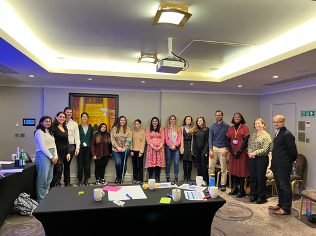
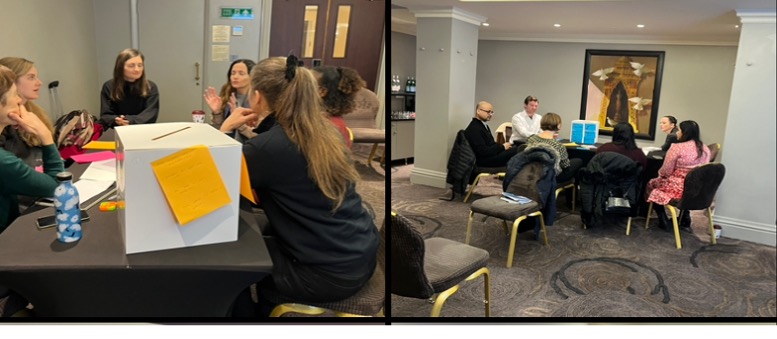
4-Our vision is evolving from Peer-to-Peer support to HangOUT: Hang Our Unified Team.
The last few months helped us to build a sense of community and a unified team of clinicians and young people: our authentic relationship is underpinned by empathy and integrity.
We feel that normalising this model of collaboration can help not only to empower and support young people to develop their activation (knowledge, skills, and confidence) in managing their own health, but can equally help clinical teams to develop their activation in relation to embedding holistic care as part of routine practice.
One of the highlights of our recent engagement event, co-facilitated by our young intern Imani, was ‘the role play session’. Our ambition is to use this approach to develop our jargon dictionary (the latest term added to our dictionary was “local chemist” instead of “community pharmacist” ); and notably the use role play simulations for regular staff training.
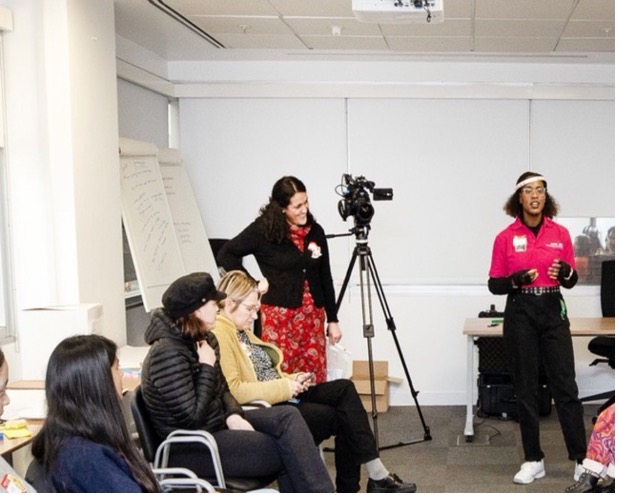
Imani facilitating our most recent event: Hangout space
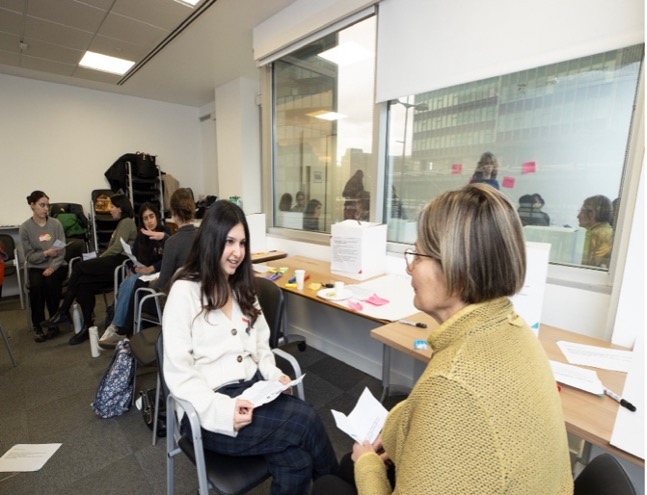
Role play: clinician is sitting in the shoes of a young person; and a young person playing the role of a clinician in a 20mn consultation.
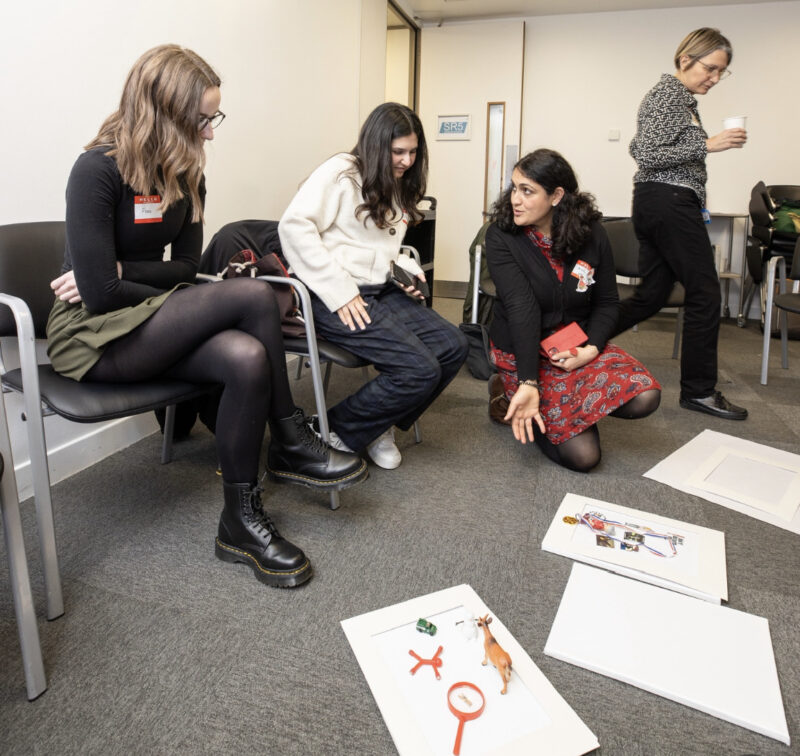
Young people using art work to visualise the challenges they face as they navigate health systemsWHAT COULD OTHERS LEARN FROM YOUR EXPERIENCE?
1- Put your lived experience partners at the heart of your journey and RIGHT FROM THE START.
They are the expert by experience and their input will complement the clinical expertise. As a health system we should invest in our assets!2- Keep the connection going between your team and your lived experience partners. they are all human of the same system.
Having an ongoing dialogue in this project, clarified even more our direction: a new model of holistic care underpinned by a meaningful collaboration.
Shifting the paradigm vision goes beyond health promotion, it’s about shifting the culture and power dynamic in health systems where everyone expertise is appreciated, mobilised and optimised.Finally, we would like to say massive THANK YOU to every Q member who supported us over the last year. Your guidance is so invaluable. We look forward to sharing more updates (including a short film) as we immerse ourselves more into this wonderful journey.
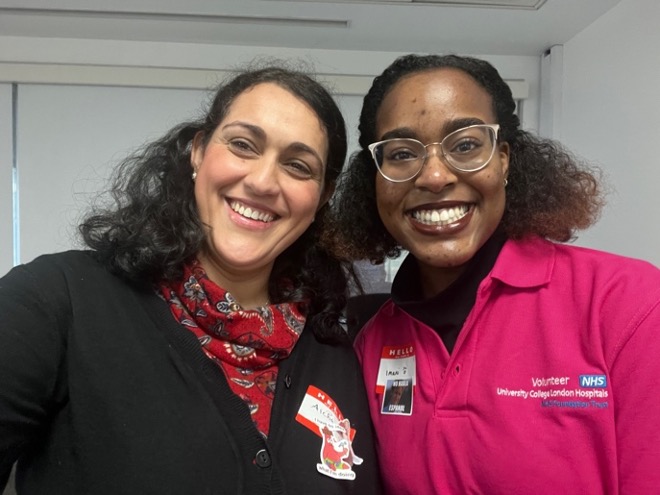
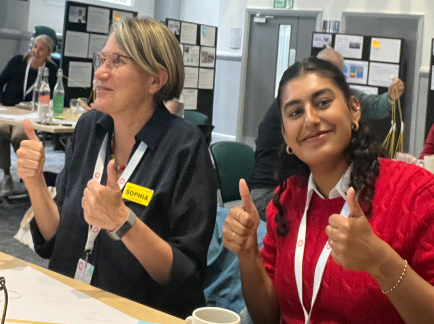
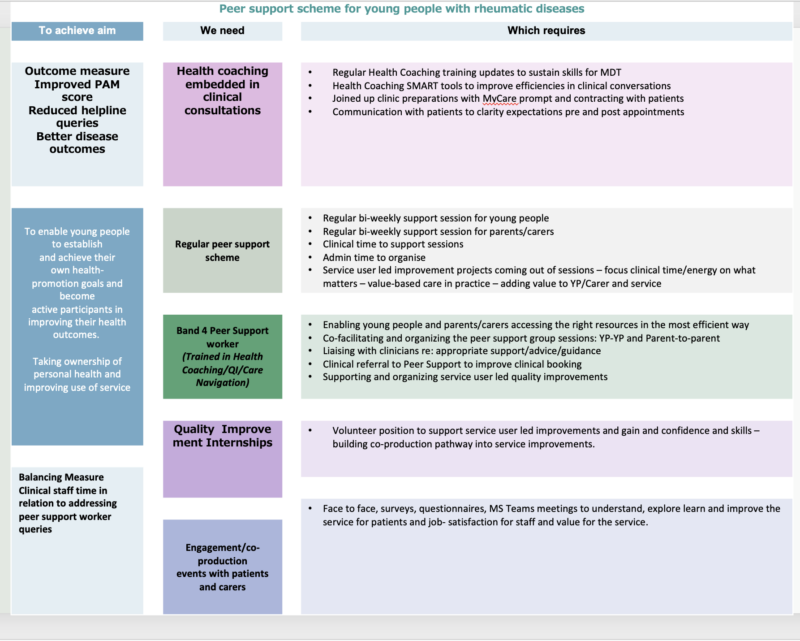
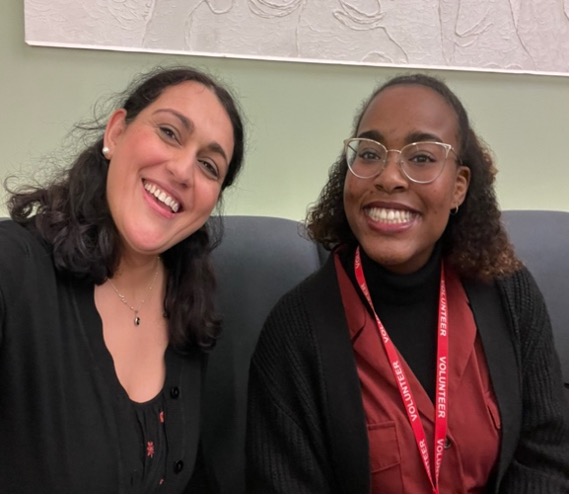
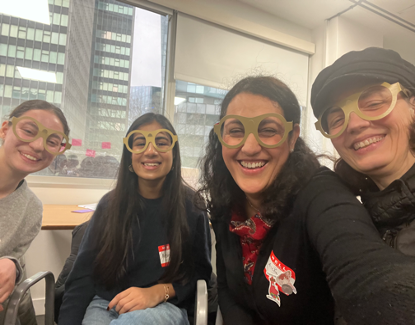
Comments
Clare Smith 5 Jun 2023
I really like this idea, and the concept of young people receiving health coaching will hopefully establish new patterns of thinking around health and wellness and encourage young people to be active agents in their own wellness and recovery.
There are so many applications for this beyond the project and I really look forward to hearing updates if you are successful. Good luck!
Adenike Olakunle 24 May 2023
This project will be a life-changing and empowering one. I will definitely be following up on the project and look forward to the outcome.
Well done Aicha
Aicha Bouraoui 24 May 2023
Dear Adenike,
Thank you so much for your thoughtful feedback. So very kind of you.
I look forwards to collaborate with you; and our great colleagues in the Q community!
Fay Sibley 16 May 2023
Great project that will add to the evidence base demonstrating the importance of self activation, supported self management and peer support.
Aicha Bouraoui 19 May 2023
Thank you so much Fay for engaging with Q Exchange and for your time in considering our project!
Elena Nikiphorou 15 May 2023
Great to see this initiative - a very important project, with potential to make positive change.
Aicha Bouraoui 19 May 2023
Thank you so much Elena for your thoughtful Feedback! greatly appreciated!
Comments are now closed for this post.